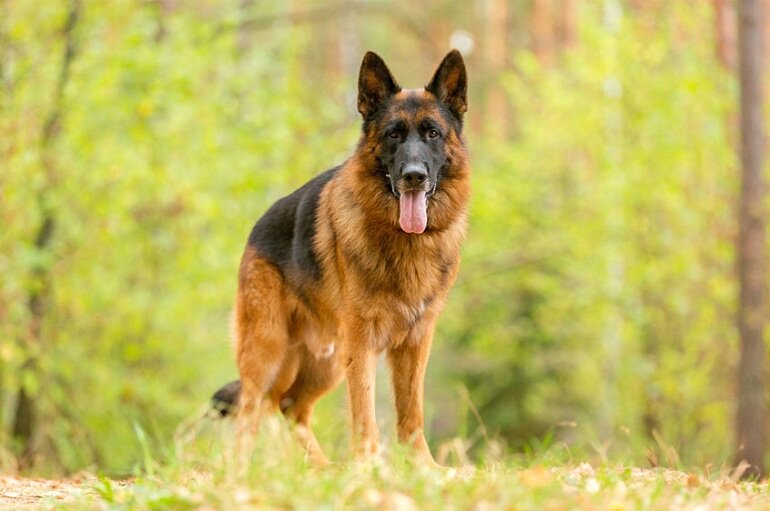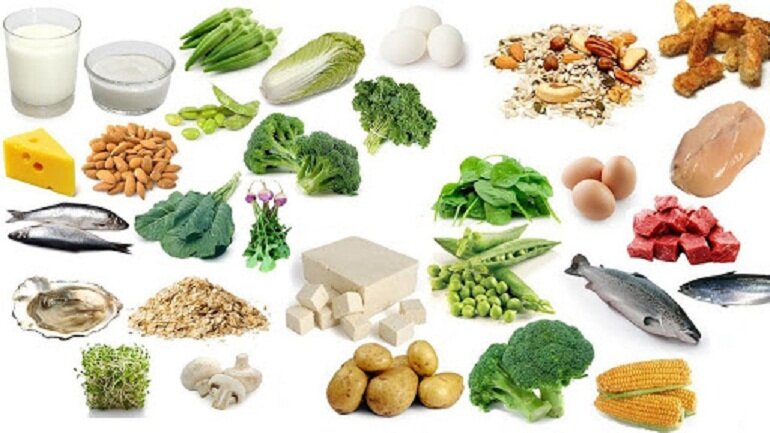German Shepherds are not picky eaters, but for them to develop fully, owners need to develop a scientific, complete nutritional diet and choose the right food for German Shepherds.
The origin of the German Shepherd is a breed of dog specialized for herding sheep. Due to continuous and high-intensity activities, they eat well, can eat many types of food and are not picky about food. However, for those who are just starting to raise German Shepherd dogs, choosing food and building a nutritional regimen and diet for this dog breed is still a difficult problem.

What nutrients do German Shepherd dogs need?
Like other dog breeds, German Shepherd dog food Need to provide enough groups of nutrients for healthy and comprehensive development. Specifically, the German Shepherd dog’s body needs to provide protein, fiber, fat, vitamins and minerals, and starch.
In particular, protein plays an important role in muscle formation, body development and strength. Fats and starches provide energy for German Shepherds to be healthy enough to function every day. Fiber helps prevent constipation and helps the digestive system function better. Vitamins and minerals help increase resistance, brain development and improve the immune system for German Shepherd dogs to stay healthy.
A complete and scientific nutritional regimen at each meal not only helps German Shepherd dogs grow quickly and healthily but also maximizes their outstanding advantages.

Types of food for German Shepherd dogs that should be eaten every day
– Foods rich in protein: Protein is found in meat, eggs and animal organs such as: lean pork, beef, chicken, duck, lamb, liver, intestines, lungs, heart, kidneys , brain, oval, duck eggs, chicken eggs, duck eggs, quail eggs…
– Fat-rich foods: Normal fat is also available in protein foods. If you feed your German Shepherd dog food, you don’t need to worry about them lacking fat. But if you feed your German Shepherd dog dry food, you need to supplement their fat with beef fat, chicken fat, or pork fat in moderate amounts. You can cook the fat, mix it with dry food and feed it to your German Shepherd dog every day.
An important note when choosing German Shepherd dog food In processed form, you need to choose products from reputable brands to ensure they have all the nutritional ingredients that German Shepherd dogs need to provide every day. Some reputable dry dog food brands include Smartheart, Classic Pets, Fib’s, Home Dog, Zenith, Royal Canin…
– Foods rich in fiber: Vegetables, tubers, lettuce, fruits, carrots, zucchini, celery, broccoli… To get German Shepherd dogs to eat vegetables, you should chop them and mix them with rice and meat.
– Foods rich in starch: Rice, porridge, potatoes, sweet potatoes, cassava, cookies…
– Foods rich in vitamins and minerals: milk, eggs, apples, oranges, blueberries, kiwi, bananas, watermelon, dragon fruit, shrimp, fish, snails, crabs, clams… These German Shepherd dog food This has a great effect in increasing the resistance of German Shepherd dogs to stay healthy and less sick.

Daily diet of German Shepherd dogs according to age
Each German Shepherd dog of different ages will have a different daily diet. Specifically:
+ German Shepherd dog from 2-3 months: Feed 4 meals/day, each meal about 200-300g. Continue to drink another 300ml of milk/day. Food must be cooked until smooth and thin.
+ German shepherd dog from 3-4 months: Feed 3 meals/day, food volume increased to 400-500g/meal. Continue to drink about 500ml of warm milk/day. Food does not need to be ground but must still be cooked until soft. Absolutely do not feed hard foods.
+ German shepherd dog from 4-6 months: Still fed 3 meals/day, food volume increased to about 500-600g/meal. Food needs to be rich in protein and fat. Harder foods can be given.
+ German Shepherd dogs from 6 months or older: Feed 2-3 meals/day, diet increased to 700-800g/meal. You should feed hard foods to help German Shepherd dogs develop their teeth and jaw muscles.

* Above is information about nutrition, rations and German Shepherd dog food. Hopefully after reading this article, you will have enough confidence and knowledge to care for your German Shepherd to develop healthily and comprehensively. Wish you success!


















































































